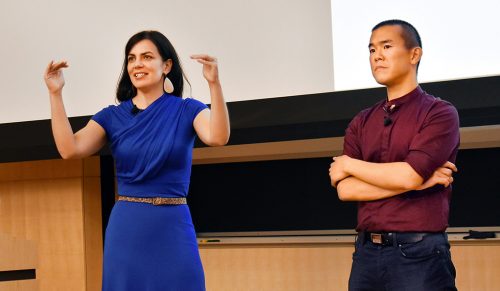Image courtesy of Yale News.
In a not-so-unusual scene at Benjamin Franklin College, whose dining hall often seats professors from nearby Science Hill, I meet three scientists over lunch. Not once do I see their faces. Instead, their identities unravel through their voices, shuttled by my headphones. Within an hour, I listen to three stories that transform my perspectives on love, longing, and loss.
Through weekly podcasts and live shows, The Story Collider exposes listeners to true science stories that combat the traditional portrayal of science as exclusive. “Storytelling is powerful to scientists because it takes science out of the abstract and esoteric and draws the audience into the lived experiences of human beings,” said Liz Neeley, executive director of the nonprofit.
Zoologist Devon Kodzis, the first scientist I listen to, begins by recounting her botched attempt at attracting a kindergarten crush using the topi antelope strategy, the first of many animal fact fiascos that thwart her romantic interests. When she finally represses her references when conversing with a guy at a college party, she is stunned to hear him gush over their shared favorite animal, the giant Pacific octopus. “To many, scientists barely register as real people due to caricatures in their minds that are dominated by ideas from fiction or popular media,” Neeley said. But Kodzis’ endearing personality reveals that scientists, shockingly, experience emotions as irrational as love.
Wetland scientist Lylianna Allala follows by recalling a phone call her mother has with a classmate’s mother that mysteriously prevents Allala from collaborating with the classmate on a solar system project. Twenty years later, she realizes the partnership ended because her classmate’s white mother did not want her child to be involved with a Mexican American family. “When people process information relating to a politically polarized issue, data-based argumentation only reinforces opposition,” Neeley said. Allala’s story—ultimately about how feeling unfit to be a science partner deterred her pursuit of science—conveys disparities in STEM representation more powerfully than numbers.
Attending surgeon Bhuvanesh Singh concludes the podcast by depicting a bond with his patient, Alice. Blissful at having perfectly executed her operation, Singh is devastated when she returns months later and neither physician precision nor patient perseverance can cure the cancer. “Sometimes the criticism of storytelling is that its rhetorical power comes from making people feel emotions instead of thinking logically, but I believe that to be human is to have both those sides, and the parts of me that respond to emotional stories do not somehow make me less scientific,” Neeley said. From Alice, Singh realizes that healing comes less from steeliness—of scalpel or state of mind—and more from emotional vulnerability that eases patients’ fears at their most difficult times.
Neeley tells me that story-listening has pushed her to appreciate the everyday stories around her. After listening to The Story Collider’s podcasts, I can corroborate. As I leave the dining hall, I wonder how stories shape the passions, scientific and otherwise, of everyone I pass. I wonder how they will shape mine.
Citations:
Liz Neeley, personal communication, January 28, 2020.
Kodzis, Devon. (Storyteller). (2019, Nov 1). Crushes: Stories About Scientists in Love [Audio podcast]. https://www.storycollider.org/stories/2019/10/28/crushes-stories-about-scientists-in-love.
Allala, Lylianna. (Storyteller). (2019, Oct 4). My First Science: Stories About Early Experiences with Science [Audio podcast]. https://www.storycollider.org/stories/2019/9/30/my-first-science-stories-about-early-experiences-with-science.
Bhuvanesh, Singh. (Storyteller). (2019, Aug 23). Surgery: Stories About Operations [Audio podcast]. https://www.storycollider.org/stories/2019/8/19/surgery-stories-about-operations.

